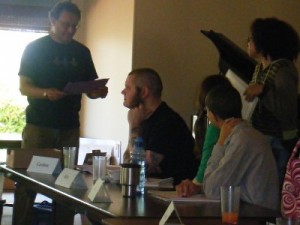 This post is the third in a series of ten about my experiences at Clarion West Writers Workshop in 2008. I’ll talk about the first week of the workshop, when Paul Park instructed. Here’s Part 1 and Part 2 of the series. I ended Part 2 by saying that at the mysterious space station in geosynchronous orbit above Seattle, where the workshop is held, I started the first week proper by thinking about characterization.
This post is the third in a series of ten about my experiences at Clarion West Writers Workshop in 2008. I’ll talk about the first week of the workshop, when Paul Park instructed. Here’s Part 1 and Part 2 of the series. I ended Part 2 by saying that at the mysterious space station in geosynchronous orbit above Seattle, where the workshop is held, I started the first week proper by thinking about characterization.
Because characterization is what Paul Park began by talking about.
Paul, a tall, fit guy, struck me and others as confident and intense. Among other books, he’s written the Roumania Quartet novels and the short story collection If Lions Could Speak. He seemed very much a ‘thinker’, and that partly explains why I could easily relate to him and what he had to say. Since it was only the first week of the workshop, no one had turned any stories in; so, instead of the Milford story-critiquing method that drove the workshop through weeks 2 to 6, Paul lectured — mostly in a Socratic way. Sometimes he used exercises he asked us to hand in as the basis for his lectures.
Paul said that on the whole, our Clarion submission stories, while packed with whizbang ideas, didn’t make him invest in the characters strongly enough. So throughout the week he gave us a bunch of tips about characterization and other aspects of fiction-writing. I can tell you without looking at my notes what tips Paul gave that stuck with me the most. Bear in mind I’m paraphrasing.
- Story events happen because of the way people (the characters) are; writers shouldn’t just construct plots and then shoehorn characters in.
- Compressing the timespan of a short story can often give it more ‘kinetic energy.’ Classical unities and whatnot.
- Too frequently, writers use point-of-view characters’ physiological reactions as a shortcut attempt to convey emotion. For example — and this my example, not Paul’s — all too often writers trying to evoke, say, fear, strew sentences such as “Her scalp tingled” and “Her scalp prickled” and “Her scalp tightened” across even just a single short story. The physiological reactions become unintentionally comical (or annoying) tics. You start to wonder if the scalp-y character simply needs a different type of shampoo. The best book I ever read about representing emotion in fiction without resorting to cliches, by the way, was Ann Hood‘s Creating Character Emotions. I have no idea why that book doesn’t get more attention. Most fiction-writing books are nearly useless; Ann Hood’s isn’t.
- Many writers, trying to convey what secondary characters feel, rely far too much on simply reporting the characters’ facial expressions. Sometimes that’s necessary, but conveying what secondary characters feel is (often) a lot more effective when the characters simply do things. Example — and again this is my example, not Paul’s — instead of “her eyes were ablaze with anger” why not “she picked up the baseball bat and pointed its business end at me as though the bat were a sword”? To me, fictional facial expressions are the most obnoxious when writers use eyes to relay to readers what secondary characters feel. How many times have you read “Her eyes were ablaze with anger” in your favorite airport novel?

Sometimes in real life people do communicate startling things exclusively with their eyes, and it’s such an intense experience that cliche sentences don’t do it justice. Oh, and check this out, the study of eye contact is called oculesics. I gotta learn more about them thar oculesics, but I can’t find much written on the subject, can’t find any sort of expert oculesics-ist (or whatever). So for now I simply stare at people and ask them what we’re feeling. People don’t take it too kindly.
The collection of fiction-writing tips I come home from the space station with wasn’t at all the point. The entire workshop process improved my writing and me in ways a list of tips can’t convey. The whole process seemed a sort of artsy group therapy, centered around words and storytelling, both of which have a great deal to do with how people mature and generate meaning. Somewhere therein lies the key to what Clarion West meant. At the time, though, I was far too busy to ask myself what the heck Clarion West was adding up to — the Apollo astronauts generally say the same thing about when they went to outer space: ‘We were too busy picking up rocks and setting down experiment packages to write poems about our feelings.’



 Twitter:
Twitter:
Join the conversation